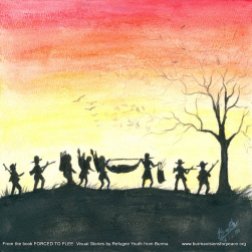by Guest Blogger, Erika Berg*
The coronavirus has struck us hard and fast and will continue to wreak havoc, worldwide, for the foreseeable future. While our daily routines have been disrupted, COVID-19 has hit refugee families in our communities particularly hard, impacting their lives in ways that most of us can’t imagine. Before being resettled in the United States, refugees survive outbreaks of violent conflict and persecution in their countries of origin; live for many years in overcrowded camps and urban slums; and then less than .5% of them – those considered especially at-risk – undergo a lengthy and rigorous screening process .
Once refugees touch down in the U.S., their struggle begins anew. Shepherded and coached by dedicated resettlement workers, like the team at LSSNCA, they are moved into an apartment or home. They study English, learn how to navigate public transportation, enroll their children in schools and start working… a crash course in life in America, demanding physically, mentally and emotionally. Required to become self-sufficient in one year, there is little time to reflect or heal. While striving to become contributing members of society, behind their smiles, they are coping with extreme trauma from the past and grieving the loss of their ancestral lands and loved ones, including those still in harm’s way.
If you know anyone who has been forced to flee their homeland, you also know that refugees are unusually adaptable, resilient, resourceful, courageous, and irrepressibly hopeful. They wouldn’t have made it this far, otherwise. However due to language and cultural barriers, they are also marginalized. And in the age of COVID-19, bombarded by conflicting information in the media, they are increasingly vulnerable.
Thankfully, even self-isolated, there are still ways you can help newly arrived refugees in the DMV:
- DONATE
- VOLUNTEER
- SPREAD THE WORD: Share your concerns and the links, above. Now more than ever, refugees – and those working with them directly – need our support.
These are unprecedented times. COVID-19 is our global enemy. The entire world must work to contain it, a stark reminder of our interconnectedness. Health professionals and first responders on the front lines of the pandemic are overwhelmed. The coronavirus is testing our humanity. Moved by a shared sense of urgency, ordinary citizens are answering the cries of the most vulnerable, often bravely. While scrambling to help, we mustn’t lose sight of the margins of our society, including those who literally can’t ask for help.
*In Seattle, Erika Berg worked with the Refugee and Immigrant Children’s Program at Lutheran Community Service NW. As Community Outreach Coordinator, she increased awareness of the need for foster parents for unaccompanied refugee minors, among the most vulnerable refugees. Since, she has facilitated Visual Storytelling Workshops with refugees, asylum-seekers, and survivors of torture from around the world. In 2015, Erika published Forced to Flee: Visual Stories by Refugee Youth from Burma, winner of the Indie Book Award. For a preview, please visit the book’s website, www.burmavisionsforpeace.org. Erika now lives in Washington, DC where she continues to mobilize support for those forced to flee.



